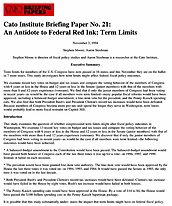Term limits for members of the U.S. Congress have now passed in 16 states, and this November they are on the ballot in 7 more states. This study investigates how term limits might affect federal fiscal policy outcomes.
We examine recent key votes on budget and tax issues and compare the voting behavior of the members of Congress with 6 years or less in the House and 12 years or less in the Senate (junior members) with that of the members with more than 6 and 12 years experience (veterans). We find that if only the junior members of Congress had been voting in recent years–as would be the case if all members were term limited–many popular fiscal reforms would have been approved, including a balanced-budget amendment, a line-item veto for the president, and the Penny-Kasich spending cuts. We also find that both President Bush’s and President Clinton’s record tax increases would have been defeated. Because members of Congress become more pro-tax-and-spend the longer they serve in Washington, term limits would probably lead to more fiscal restraint on Capitol Hill.

This work is licensed under a Creative Commons Attribution-NonCommercial-ShareAlike 4.0 International License.

